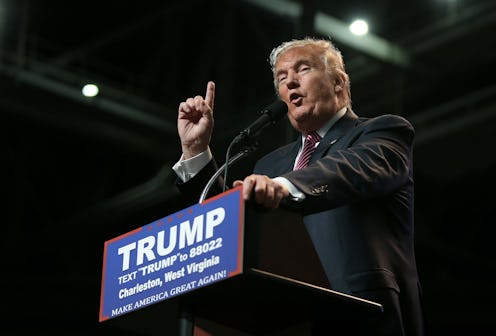News
What Trump And Sanders Now Have In Common
Less than a full day after being named the presumptive Republican nominee, Donald Trump was already changing another policy of his. On Wednesday, Trump offered a new view on the minimum wage in an interview with Wolf Blitzer on CNN. Reversing his previous stance that the current federal minimum wage of $7.25 was too high, he said he was now "open to doing something with it.” Is he executing a classic Trump flip-flop? Did he... forget his past stance on minimum wage?
Or is he possibly luring Bernie Sanders' supporters by camouflaging himself in one of the Vermont senator's key platform issues, raising minimum wage?
Responding to Blitzer's question about minimum wage, Trump said, “I’m actually looking at that because I am very different from most Republicans." Generally, GOP candidates have spoken against raising the minimum wage. Trump continued, "You have to have something that you can live on. ... If you start playing too much with the lower level numbers, you're not going to be competitive."
This is a total 180 from his past remarks, in which he, just like his then-competing Republican opponents, spoke against raising minimum wage. In a November Republican debate, he said, “Taxes too high, wages too high, we’re not going to be able to compete against the world ... I hate to say it, but we have to leave [the minimum wage] the way it is."
Moving from "leave it the way it is" to "let's do something with it" is a big(ly) leap. Flipping sides is a signature move for Trump, from drastic changes, like his policies on abortion, to smaller but still baffling ones, such as his thoughts on whether small talk is good, as Politico noted in a Thursday article.
In this case, however, there are more than a few hints of a Sanders-themed motive behind his minimum wage switch. Sanders is popular for championing a raise of the minimum wage to $15. Hillary Clinton has less fervently but just as publicly supported raising the minimum wage, too — to $12. As her campaign website notes, Clinton supports "recent efforts in Los Angeles and New York to raise their minimum wage to $15," so, you know, she's not opposed to that $15 mark. Prior to his revised minimum wage remarks on Wednesday, Trump would have been the only candidate left in the race who was against any sort of raise, which potentially would have him less appealing, especially in a climate in which 97 percent of Democrats and 77 percent of Republicans support at least some kind of raise, according to an Oxfam America survey in 2015.
So Trump's change in stance on minimum wage may reflect an attempt to appeal to more voters, especially Sanders'. It's known that a faction of Sanders' supporters wouldn't go for Clinton in a general election — they've even rallied together recently in the #NeverClinton movement. It's also known that Trump is trying to win over Sanders' supporters as the Vermont senator's campaign dies down. Recently, Trump has tweeted sympathetically about Sanders in what some say is another ploy to get on the good side of his fans.
As a matter of fact, in his interview, Blitzer brought up the issue of wooing Sanders' supporters. Trump's decisive response? "I'll get 'em." I think it's (thankfully) a long-shot, but then again, that's what many thought about Trump's entire campaign.
